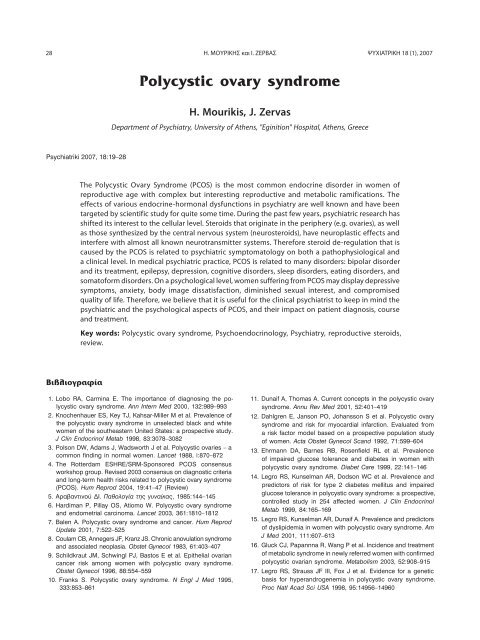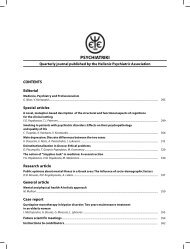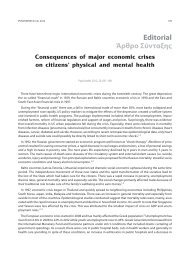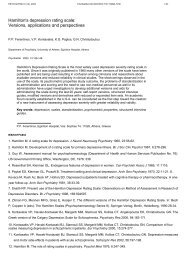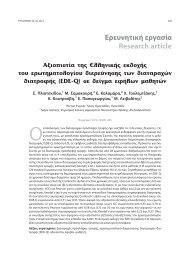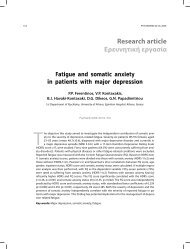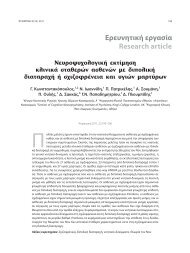28 H. ΜΟΥΡΙΚΗΣ και Ι. ΖΕΡΒΑΣ ΨΥΧΙΑΤΡΙΚΗ 18 (1), 2007Polycystic ovary syndromeH. Mourikis, J. ZervasDepartment of Psychiatry, University of Athens, "Eginition" Hospital, Athens, GreecePsychiatriki 2007, 18:19–28The Polycystic Ovary Syndrome (PCOS) is the most common endocrine disorder in women ofreproductive age with complex but interesting reproductive and metabolic ramifications. Theeffects of various endocrine-hormonal dysfunctions in psychiatry are well known and have beentargeted by scientific study for quite some time. During the past few years, psychiatric research hasshifted its interest to the cellular level. Steroids that originate in the periphery (e.g. ovaries), as wellas those synthesized by the central nervous system (neurosteroids), have neuroplastic effects andinterfere with almost all known neurotransmitter systems. Therefore steroid de-regulation that iscaused by the PCOS is related to psychiatric symptomatology on both a pathophysiological anda clinical level. In medical psychiatric practice, PCOS is related to many disorders: bipolar disorderand its treatment, epilepsy, depression, cognitive disorders, sleep disorders, eating disorders, andsomatoform disorders. On a psychological level, women suffering from PCOS may display depressivesymptoms, anxiety, body image dissatisfaction, diminished sexual interest, and compromisedquality of life. Therefore, we believe that it is useful for the clinical psychiatrist to keep in mind thepsychiatric and the psychological aspects of PCOS, and their impact on patient diagnosis, courseand treatment.Key words: Polycystic ovary syndrome, Psychoendocrinology, Psychiatry, reproductive steroids,review.Bιβλιογραφία1. Lobo RA, Carmina E. The importance of diagnosing the po -lycystic ovary syndrome. Ann Intern Med 2000, 132:989–9932. Knochenhauer ES, Key TJ, Kahsar-Miller M et al. Prevalence ofthe polycystic ovary syndrome in unselected black and whitewomen of the southeastern United States: a prospective study.J Clin Endocrinol Metab 1998, 83:3078–30823. Polson DW, Adams J, Wadsworth J et al. Polycystic ovaries – acommon finding in normal women. Lancet 1988, i:870–8724. The Rotterdam ESHRE/SRM-Sponsored PCOS consensusworkshop group. Revised 2003 consensus on diagnostic criteriaand long-term health risks related to polycystic ovary syndrome(PCOS). Hum Reprod 2004, 19:41–47 (<strong>Review</strong>)5. Αραβαντινού ∆Ι. Παθολογία της γυναίκας, 1985:144–1456. Hardiman P, Pillay OS, Atiomo W. Polycystic ovary syndromeand endometrial carcinoma. Lancet 2003, 361:1810–18127. Balen A. Polycystic ovary syndrome and cancer. Hum ReprodUpdate 2001, 7:522–5258. Coulam CB, Annegers JF, Kranz JS. Chronic anovulation syn dromeand associated neoplasia. Obstet Gynecol 1983, 61:403–4079. Schildkraut JM, Schwingl PJ, Bastos E et al. Epithelial ovariancancer risk among women with polycystic ovary syndrome.Obstet Gynecol 1996, 88:554–55910. Franks S. Polycystic ovary syndrome. N Engl J Med 1995,333:853–86111. Dunaif A, Thomas A. Current concepts in the polycystic ovarysyndrome. Annu Rev Med 2001, 52:401–41912. Dahlgren E, Janson PO, Johansson S et al. Polycystic ovarysyndrome and risk for myocardial infarction. Evaluated froma risk factor model based on a prospective population studyof women. Acta Obstet Gynecol Scand 1992, 71:599–60413. Ehrmann DA, Barnes RB, Rosenfield RL et al. Prevalenceof impaired glucose tolerance and diabetes in women withpolycystic ovary syndrome. Diabet Care 1999, 22:141–14614. Legro RS, Kunselman AR, Dodson WC et al. Prevalence andpredictors of risk for type 2 diabetes mellitus and impairedglucose tolerance in polycystic ovary syndrome: a prospective,controlled study in 254 affected women. J Clin EndocrinolMetab 1999, 84:165–16915. Legro RS, Kunselman AR, Dunaif A. Prevalence and predictorsof dyslipidemia in women with polycystic ovary syndrome. AmJ Med 2001, 111:607–61316. Gluck CJ, Papannna R, Wang P et al. Incidence and treatmentof metabolic syndrome in newly referred women with confirmedpolycystic ovarian syndrome. Metabolism 2003, 52:908–91517. Legro RS, Strauss JF III, Fox J et al. Evidence for a geneticbasis for hyperandrogenemia in polycystic ovary syndrome.Proc Natl Acad Sci USA 1998, 95:14956–14960
PSYCHIATRIKI 18 (1), 2007 Η ΣΗΜΑΣΙΑ ΤΟΥ ΣΥΝΔΡΟΜΟΥ ΠΟΛΥΚΥΣΤΙΚΩΝ ΩΟΘΗΚΩΝ ΓΙΑ ΤΗΝ ΨΥΧΙΑΤΡΙΚΗ 2918. Stoffel-Wagner B. Neurosteroid biosynthesis in the humanbrain and its clinical implications. Ann N Y Acad Sci 2003,1007:64–7819. Prange-Kiel J, Wehrenberg U, Jarry H et al. Para/autocrineregulation of estrogen receptors in hippocampal neurons.Hippocampus 2003, 13:226–23420. Hojo Y, Hattori TA, Enami T et al. Adult male rat hippocampussynthesizes estradiol from pregnenolone by cytochromesP45017α and P450 aromatase localized in neurons. Proc NatlAcad Sci USA 2004, 101:865–87021. von Schassen C et al. Oestrogen synthesis in the hippocampus:Role in axon outgrowth. J Neuroendocrinol 2006, 18:847–85622. Stahl SM. Essential psychopharmacology. 2nd ed, 2000:551–55823. Garcia-Segura LM, Azcoitia I, DonCarlos LL. Neuroprotectionby estradiol. Prog Neurobiol 2001, 63:29–6024. Wise PM. Estrogens and neuroprotection. Trends EndocrinolMetab 2002, 13:229–23025. Bisagno V, Bowman R, Luine V. Functional aspects of estrogenin neuroprotection. Endocrine 2003, 21:33–4126. Kajta M, Beyer C. Cellular strategies of estrogen-mediatedneuroprotection during brain development. Endocrine 2003,21:3–927. MacLusky NJ, Hajszan T, Prange-Kiel J et al. Androgenmodulation of hippocampal synaptic plasticity. Neuroscience2006, 138:957–965, Epub 2006 Feb 20 (<strong>Review</strong>)28. Gold SM, Voskuhl RR. Testosterone replacement therapy forthe treatment of neurological and neuropsychiatric disorders.Curr Opin Investig Drugs 2006, 7:625–63029. Aloisi AM. Gonadal hormones and sex differences in painreactivity. Clin J Pain 2003, 19:168–17430. Bixo M, Andersson A, Winblad B et al. Progesterone, 5alphapregnane-3,20-dioneand 3alpha-hydroxy-5alpha-pregnane-20-one in specific regions of the human female brain in differentendocrine states. Brain Res 1997, 764:173–17831. Bixo M, Backstrom T, Winblad B et al. Estradiol andtestosterone in specific regions of the human female brain indifferent endocrine states. J Steroid Biochem Mol Biol 1995,55:297–30332. Kelly MJ, Qiu J, Wagner EJ et al. Rapid effects of estrogen onG protein-coupled receptor activation of potassium channelsin the central nervous system (CNS). J Steroid Biochem MolBiol 2002, 83:187–19333. Twyman RE, Macdonald RL. Neurosteroid regulation of GABA Areceptor single-channel kinetic properties of mouse spinal cordneurons in culture. J Physiol 1992, 456:215–24534. Welch KM, Choudhuri R, Cui L et al. Estrogen regulation ofgene expression in cortical spreading depression: relevanceto menstrual migraine. Headache 2002, 42:44035. Gundlah C, Kohama SG, Mirkes SJ et al. Distribution ofestrogen receptor beta (ERbeta) mRNA in hypothalamus,midbrain and temporal lobe of spayed macaque: continuedexpression with hormone replacement. Brain Res Mol BrainRes 2000, 76:191–20436. McEwen BS. Invited review: estrogens effects on the brain:multiple sites and molecular mechanisms. J Appl Physiol 2001,91:2785–280137. Pau CY, Pau KY, Spies HG. Putative estrogen receptor betaand alpha mRNA expression in male and female rhesusmacaques. Mol Cell Endocrinol 1998, 146:59–6838. Pecins-Thompson M, Brown NA, Kohama SG et al. Ovariansteroid regulation of tryptophan hydroxylase mRNA expressionin rhesus macaques. J Neurosci 1996, 16:7021–702939. Pecins-Thompson M, Brown NA, Bethea CL. Regulation ofserotonin re-uptake transporter mRNA expression by ovariansteroids in rhesus macaques. Brain Res Mol Brain Res 1998,53:120–12940. Smith LJ, Henderson JA, Abell CW et al. Effects of ovariansteroids and raloxifene on proteins that synthesize, transport,and degrade serotonin in the raphe region of macaques.Neuropsychopharmacology 2004, 29:2035–204541. Bethea CL, Lu NZ, Gundlah C et al. Diverse actions of ovariansteroids in the serotonin neural system. Front Neuroendocrinol2002, 23:41–10042. Simonian SX, Herbison AE. Differential expression of estrogenreceptor and neuropeptide Y by brainstem A1 and A2noradrenaline neurons. Neuroscience 1997, 76:517–52943. Kandel E, Schwartz JH, Jessell T. Principles of neural science.4th ed. McGraw Hill Medical, 200044. Woolley CS, McEwen BS. Estradiol mediates fluctuation inhippocampal synapse density during the estrous cycle in theadult rat. J Neurosci 1992, 12:2549–255445. Woolley CS. Estrogen-mediated structural and functionalsynaptic plasticity in the female rat hippocampus. Horm Behav1998, 34:140–14846. Murphy DD, Segal M. Regulation of dendritic spine densityin cultured rat hippocampal neurons by steroid hormones. JNeurosci 1996, 16:4059–406847. Gazzaley AH, Weiland NG, McEwen BS et al. Differentialregulation of NMDAR1 mRNA and protein by estradiol in therat hippocampus. J Neurosci 1996, 16:6830–683848. Shughrue PJ, Merchenthaler I. Estrogen is more than just a “sexhormone” novel sites for estrogen action in the hippocampusand cerebral cortex. Front Neuroendocrinol 2000, 21:95–10149. Amandusson A, Hallbeck M, Hallbeck AL et al. Estrogeninducedalterations of spinal cord enkephalin gene expression.Pain 1999, 83:243–24850. Gordon FT, Soliman MR. The effects of estradiol andprogesterone on pain sensitivity and brain opioid receptorsin ovariectomized rats. Horm Behav 1996, 30:244–25051. Martin VT, Behbehni M. Ovarian hormones and migraineheadach: Understanding mechanisms and pathogenesis–PartI. Headache 2006, 46:3–2352. Derogatis LR. SCL-90-R. Administration, scoring and proceduresmanual. Baltimore, Clinical Psychometric Research, 198353. Elsenbruch S, Hahn S, Kowalsky D et al. Quality of life,psychosocial well-being, and sexual satisfaction in womenwith polycystic ovary syndrome. J Clin Endocrinol Metab 2003,88:5801–580754. Weiner CL, Primeau M, Ehrmann DA. Androgens and mooddysfunction in women: comparison of women with polycysticovarian syndrome to healthy controls. Psychosom Med 2004,66:356–36255. Himelein MJ, Thatcher SS. Depression and body image amongwomen with polycystic ovary syndrome. J Health Psychol (Inpress)56. Hollinrake EM, Abreu A, Sparks A. Increased risk of depressionin women with polycystic ovary syndrome. Proceedings of the61st Annual Meeting of the American Society for ReproductiveMedicine, Montreal, Canada, 200557. McCook JG. The influence of hyperandrogenism, obesity andinfertility on the psychosocial health and well-being of womenwith polycystic ovary syndrome (Dissertation). Ann Arbor MI,University of Michigan, 200258. Keegan A, Liao LM, Boyle M. “Hirsutism”: a psychologicalanalysis. J Health Psychol 2003, 8:327–345


